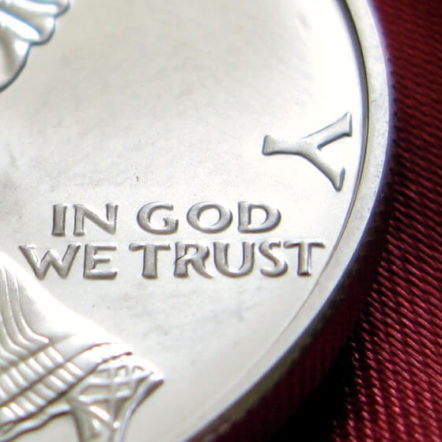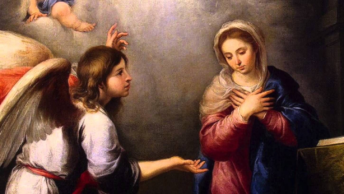About 15 years ago, a poll was taken to find out what Americans thought of the idea of removing from our currency the words: “In God we trust.” Back then, almost 17 million people responded and 89% were opposed to the removal of those words. Is that how people still feel nowadays? Perhaps it isn’t so, especially if we are keenly aware of what is going on with American politics vis-à-vis a reflection on our readings for the Twenty-fourth Sunday in Ordinary Time.
I am sure that we are all for keeping the words “In God we trust” on our currency; however, the existential question is: Are we ready and willing to truly trust in God as revealed to us by His only begotten Son Jesus Christ for the salvation of the world? We should be aware of two disquieting facts: (1) The expanding influence of secularism and (2) The visceral animosity towards any religion, particularly towards Catholicism.
A vociferous tendency, in our country and among the elitist frontrunners of the international community, shows a constant and relentless insistence on redressing all wrongs and assuring well-being without recourse to or reliance on God. Even ignoring the mounting hostility towards certain religions, through a benevolent attitude of patronizing the religious segment of society, God and faith are relegated by many to the realm of cultural traditions and folkloristic attractions for tourists. This attitude flattens everything spiritual and supernatural; and makes religious expressions toothless and insignificant or attributes to them frightening events of fanaticism and fundamentalism.
The other disquieting fact favoring the creation of a godless, purely secularist society stems from a partially justified reaction to terrorism and violence generated worldwide by fanaticism and fundamentalism. Too many atrocities and acts of violence have been perpetrated over the centuries, even by members of the Catholic Church, in the name of God and in defense of the truth however interpreted by them. Therefore, even though the Catholic Church has long ago renounced the practices of the Inquisition and the excesses of the Crusaders, she is, by some, conveniently grouped with terrorists and the Taliban.
In his book Jesus of Nazareth, Pope emeritus Benedict XVI decries all those past times in which the Church used political power to impose her beliefs and spread the Gospel with the sword. Obviously, all those excesses were misrepresentations of the Gospel and, thus, totally unjustifiable.
With this premise in front of us, we should have an honest reflection on our readings, because they describe, accurately, both the nature of the only true God and the genuine Gospel of Jesus Christ. Today, as always, Jesus challenges us to see whether we might be bold enough to trust not in a vague or convenient god, but in the God who sent him into the world with the only true message of salvation whose authenticity is guaranteed by the Resurrection.
In other words, Jesus offers to each one of us the possibility of belonging to his carefully selected Family. It is the Family of those who believe, with Peter, that he is the Christ, God’s Anointed. Quickly, we do not hesitate to consider ourselves as belonging to God’s Family. Our presence here should be sufficient to prove that. Yet, we should not be hasty in assuming that we trust in God so firmly that we think, speak, act and react as members of His Family.
The Prophet Isaiah (50:5-9) enlightens us by stating that the Christ, the Anointed of God, far from all violence, all use of force, any form of retaliation, in obedience to the Father, chooses to offer his back to flogging, his cheeks to buffet and spitting. Again, let us not be hasty in assuming that we trust in God so firmly that we think, speak, act and react as members of His Family. The Christ must suffer greatly, be rejected, be falsely accused, be nailed to a cross and, thus, in the eyes of the world, made totally powerless and ineffective. Jesus Christ presents a Gospel of total non-resistance, of complete docility, of enduring any form of violence without retaliation due to his reliance exclusively on God for complete vindication.
Suddenly, we realize that it is not so easy to claim that we TRUST in God to let Him guide us to do the part assigned to us for the salvation of the world. Those who decide to belong to God’s Family must trust in Him on the terms lived out by Christ Jesus. Hence, presently, we might find ourselves torn: should we try to work with those who consider themselves enlightened and determined to establish a strictly secular order of social justice or do we choose a God who calls us to embrace the cross and follow Jesus to a string of sure defeats, but with the guarantee, on His Word, of a final victory in the Resurrection?
We reject any form of fanaticism and fundamentalism; but what the world proposes seems so beautiful that we might feel it should be given a chance even though, in human history it hasn’t worked, not even once, precisely because of man’s wounded nature and flawed, shortsighted vision. We are asked to trust in a God who offers us only one way to change the world; and it is a way that requires being ready to live out the new commandment of loving each other as Jesus loved us on the cross even if it might require our ultimate sacrifice!
Faced with the same prospect, Peter rebuked Jesus. He urged God’s Anointed to adopt the plan of the other family, the family of Satan, and to try to fix the world’s problems without God, that is, without the cross. Today Jesus is clearly insisting that we decide if we would like to think, speak, act and react as human beings do or as true disciples of his, God’s Anointed should, relying on the continuous help of the Holy Spirit, enduring a lot without losing sight of the final victory assured to us by the Resurrection.








